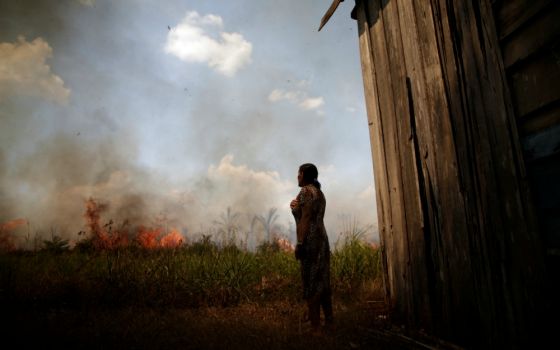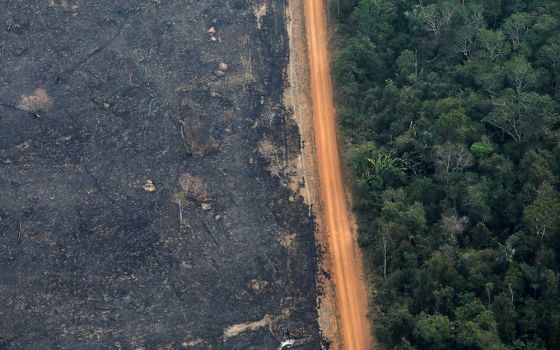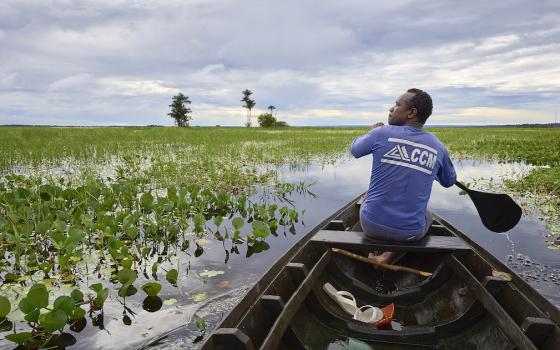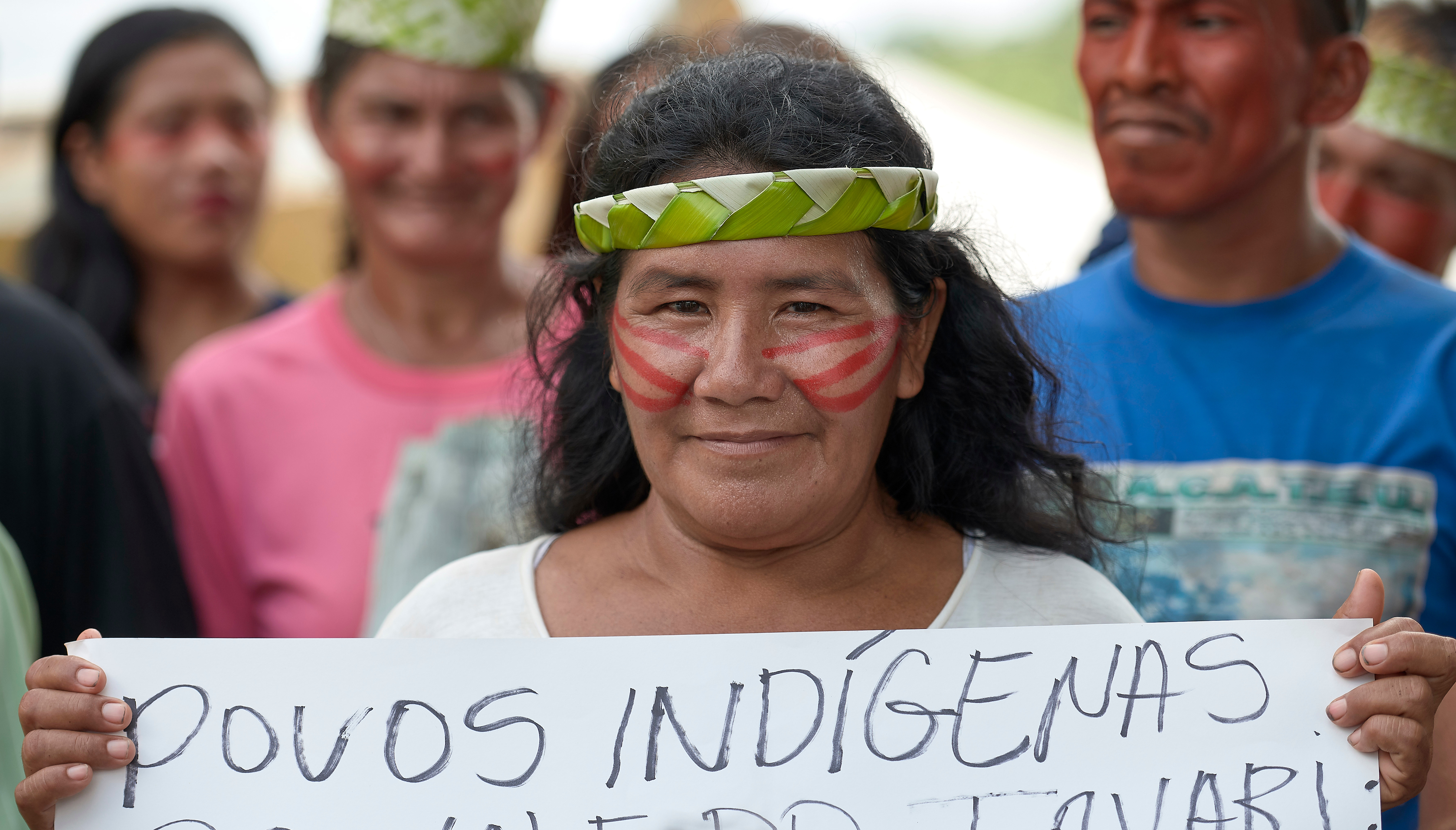
A woman in Atalaia do Norte, in Brazil's Amazon region, is seen March 27. The Pan-Amazonian Church Network, with partners in Rome, will bring more than 50 indigenous leaders to the city "to guide and animate moments of spirituality, discussions and roundtables" and to talk about the challenges their people face and their vision of ecology and the future during the October Synod of Bishops for the Amazon. (CNS/Paul Jeffrey)
The Instrumentum Laboris (or "working document") for the upcoming Pan-Amazon Synod of Bishops in Rome is bold, challenging and surprising in many ways, and not only for the reasons most people think it is. A disproportionate amount of attention has been given to proposals outlined in merely one paragraph (129) in a document that is 147 paragraphs long. The focus of supporters and detractors alike has been drawn to discussions of possibly ordaining married male indigenous elders to the ministerial priesthood and the exploration of expanding the role of women in ministry (though there is no mention of ordination in this case). While these are important and timely topics, they should not be treated in isolation.
With the synod scheduled to begin on Sunday, I think it's worthwhile to also consider the importance of the other 146 paragraphs of the working document, which lay out a synodal agenda that is unlike what typically precedes such a Vatican meeting. In particular, the document invokes language familiar to scholars of decoloniality (an academic term that refers to approaches of knowing, experience and interpretation that does not prioritize Western, Eurocentric worldviews as normative) and intercultural studies, which signals to me at least some increased openness to theological and pastoral conversations reflective of a truly global church.
One of the most striking aspects of the working document is the tone set by the text. The document does not gloss over the colonial complicity of the church in Latin America and the subsequent centuries of subjugation and injustice that has followed, especially as it relates to the church's treatment of indigenous peoples. In the opening paragraph of the first part of the document, we read: "Christ was often proclaimed in connivance with the powers that exploited the resources and oppressed the populations." (6) Later the document states: "There were moments when the Church was complicit with the colonizers, and this stifled the prophetic voice of the Gospel." (38)
Beyond acknowledging the church's historical role in the process of colonization of the lands, peoples and cultures of the Amazon region, the working document also reflects some of the key tenets of what scholars call "decoloniality" as an outlook and mode of interpretation. In addition to the material, social and political spheres, a consequence of the European colonial history in places like South America has been a coopting of knowledge and imposition of so-called Western cultures and worldviews.
Advertisement
To embrace "decoloniality" begins by recognizing this Western hegemony that has sought to destroy not only indigenous communities but also erase their cultures, insights, traditions, religions, languages, histories and worldviews. Returning to those subjugated sources of experience and wisdom is an important aim of decoloniality. Duke University professor Walter Mignolo explains in an interview that, "Decoloniality means first to delink (to detach) from that overall [colonial] structure of knowledge in order to engage in an epistemic reconstitution. Reconstitution of what? Of ways of thinking, languages, ways of life and being in the world that the rhetoric of modernity disavowed and the logic of coloniality implemented."
A move toward embracing decoloniality is recognition of the need to value and prioritize sources of wisdom and experience that do not simply come from the geographic contexts of Western Europe or North America, or the intellectual landscape of modernity. Instead, as the working document suggests, there are undervalued, overlooked and ignored loci of knowledge that ought to be valued and engaged.
The first part of the document is focused on listening to "the voice of the Amazon," which is a summation of insights from several working groups across countries and cultures in the Amazon region. "Thus a Church called to be every more synodal begins by listening to the peoples and to the earth by coming into contact with the abundant reality of an Amazon full of life and wisdom but also of contrasts." (5) The very same traditional wisdom of the diverse communities of the Amazon region that European colonizers rejected as inferior or worthlessly "pagan" in previous generations is now proposed as the very locus of insight from which the universal church can and should learn. Themes prioritized in recent church teaching, such as what Pope Francis calls "integral ecology," have long been concepts and approaches situated within the traditional teachings and practices of many indigenous populations.
There is always a risk of over-simplifying, misunderstanding or misappropriating the experiences and knowledge of communities long subordinated by colonizers and the logic of coloniality, especially when those who seek to "learn" are those who occupy positions of power and privilege. This is where the working document, while not perfect, nevertheless advocates for intercultural dialogue in a conscious effort to preserve the integrity of distinct traditions and cultures.
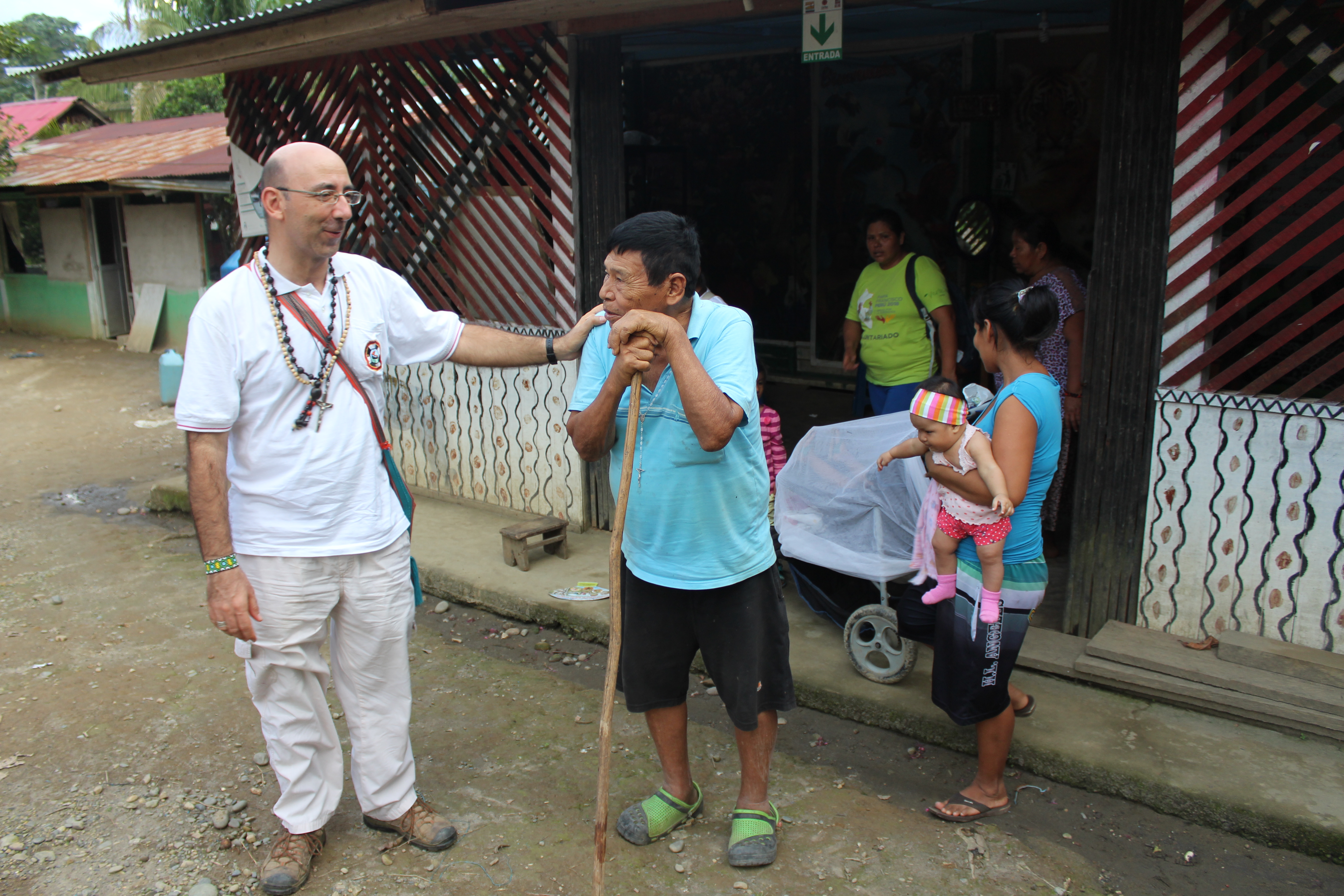
Bishop David Martinez De Aguirre Guinea, apostolic vicar of Puerto Maldonado, Peru, chats with a man from the indigenous community of Arazaire Feb. 20, 2018. The Synod of Bishops for the Amazon will take place at a time when "both human and natural life are suffering serious and perhaps irreversible destruction," Bishop Martinez said in a Sept. 12, article. (CNS/stringer)
The document refers to Pope Francis' 2018 address to a meeting of indigenous people of the Amazon, and says: "Referring to the Amazon peoples, the Pope considers that it is essential to carry out 'an intercultural dialogue in which the indigenous people will be the principal dialogue partners, especially when large projects affecting your land are proposed.' Recognition and dialogue will be the best way to transform historical relationships marked by exclusion and discrimination." (35)
Whereas the history of encounter shaped by colonial logic has led to the suppression of traditional cultures and experiences, an encounter shaped by interculturality is one of "mutual enrichment of cultures in dialogue." (122) The significance of this move should not be overlooked. For centuries, Catholic Christianity has been a partner to colonial enterprises that sought to spread church and empire by force, presuming the invalidity or, at the very least, inferiority of non-Western and non-Christian traditions. This working document makes clear that the various cultural contexts of the diverse peoples of the Amazon are to be seen as equal and mutually enriching conversation partners. Furthermore, alongside this decolonial shift and intercultural methodology, the document reiterates the importance of the inculturation of faith — valid Christianity is not limited to Western European or North American iterations, but can be embodied in and reflect a plurality of contexts across the globe.
While media attention in the coming weeks will inevitably be preoccupied with those issues seen as most contentious and controversial at the synod, another kind of history-making shift may be underway shaping how the church understands itself and engages other traditions. Whether or not the possibility of married clergy or expanded leadership roles for women in the church goes anywhere beyond the synod discussions (if these topics are even seriously discussed at all), support for embracing decoloniality and engaging in intercultural dialogue could have a lasting effect in the Catholic Church better reflecting its diverse and global identity moving forward.
[Daniel P. Horan is a Franciscan friar and assistant professor of systematic theology and spirituality at Catholic Theological Union in Chicago. His most recent book, Catholicity and Emerging Personhood: A Contemporary Theological Anthropology, was published last week. Follow him on Twitter: @DanHoranOFM]
Editor's note: Don't miss out. Sign up to receive an email notice every time a new Faith Seeking Understanding column is published.




